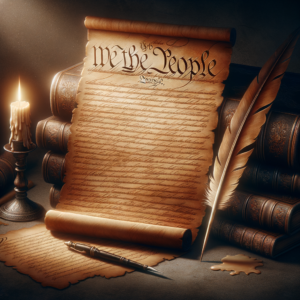Unraveling the Chaos: The Shocking Truth Behind Constitutional Interpretation
[caption id="attachment_71159" align="alignnone" width="1407"] U.S Constitution[/caption]
In a nation where the Constitution serves as the bedrock of governance and civil rights, the interpretation of its text remains a contentious and complex issue. The debate surrounding constitutional interpretation is not merely an academic exercise; it has profound implications for law, politics, and society at large. As we delve into the intricacies of this topic, we will explore its foundational principles, historical evolution, key interpretative theories, the pivotal role of the Supreme Court, contemporary challenges, and future trends in legal scholarship.
Understanding Constitutional Interpretation: A Foundation for Legal Analysis
Constitutional interpretation refers to the process by which courts and legal scholars ascertain the meaning and implications of the Constitution's text. This process is crucial for ensuring that the Constitution remains a living document that can adapt to changing societal norms and values. Legal analysts employ various methodologies to interpret the Constitution, including textualism, originalism, and purposivism, each offering distinct perspectives on how to apply constitutional principles to contemporary issues. Understanding these interpretative frameworks is essential for grasping the broader implications of legal decisions and the ongoing debates surrounding the Constitution's relevance in modern governance.
Historical Context: The Evolution of Constitutional Interpretation in the U.S.
The interpretation of the U.S. Constitution has evolved significantly since its ratification in 1788. Initially, the framers intended for the Constitution to be a flexible document, capable of adapting to the needs of a growing nation. However, early Supreme Court decisions, such as Marbury v. Madison (1803), established the principle of judicial review, empowering the Court to interpret the Constitution and invalidate laws that conflict with it. Over the decades, various historical events, including the Civil War, the New Deal, and the Civil Rights Movement, have influenced the interpretation of constitutional provisions, leading to a dynamic interplay between legal principles and societal changes.
Key Theories of Constitutional Interpretation: Originalism vs. Living Constitution
At the heart of the debate over constitutional interpretation are two primary theories: originalism and the living Constitution. Originalism posits that the Constitution should be interpreted based on the original understanding of its text at the time of ratification. Proponents argue that this approach preserves the framers' intent and provides a stable legal framework. In contrast, the living Constitution theory advocates for a more dynamic interpretation that considers contemporary societal values and circumstances. This approach allows for a more adaptable legal system but raises concerns about judicial activism and the potential for subjective interpretations. The clash between these theories continues to shape legal discourse and influence Supreme Court decisions.
The Role of the Supreme Court: Landmark Cases Shaping Constitutional Meaning
The Supreme Court plays a pivotal role in shaping constitutional interpretation through its landmark rulings. Cases such as Brown v. Board of Education (1954), which declared racial segregation in public schools unconstitutional, and Roe v. Wade (1973), which recognized a woman's right to choose an abortion, illustrate the Court's power to redefine constitutional principles in response to societal demands. These decisions not only reflect the prevailing interpretative theories of their time but also set precedents that guide future legal interpretations. The Court's role as the ultimate arbiter of constitutional meaning underscores the importance of its composition and the ideological leanings of its justices.
Contemporary Challenges: Political Polarization and Its Impact on Interpretation
In recent years, political polarization has significantly impacted constitutional interpretation, leading to heightened tensions between different ideological factions. The confirmation process for Supreme Court justices has become increasingly contentious, with nominees often facing intense scrutiny based on their perceived interpretative philosophies. This polarization has resulted in a more divided judiciary, where decisions may reflect the political inclinations of the justices rather than a unified legal standard. Additionally, public trust in the judiciary has waned, as citizens increasingly view court rulings through the lens of political affiliation rather than impartial legal reasoning. This environment poses challenges for the integrity of constitutional interpretation and the rule of law.
The Future of Constitutional Interpretation: Trends and Predictions for Legal Scholarship
Looking ahead, the future of constitutional interpretation is likely to be shaped by ongoing debates surrounding originalism and the living Constitution, as well as the growing influence of technology and globalization. Legal scholars are increasingly examining how emerging issues, such as digital privacy, artificial intelligence, and climate change, intersect with constitutional principles. Furthermore, the rise of social movements advocating for equity and justice may prompt a reevaluation of constitutional norms and values. As the legal landscape continues to evolve, the discourse surrounding constitutional interpretation will remain vibrant, reflecting the complexities of a diverse and dynamic society.
The interpretation of the U.S. Constitution is a multifaceted and evolving discourse that reflects the nation's legal, political, and social complexities. As we navigate the challenges and opportunities presented by contemporary issues, understanding the foundations and implications of constitutional interpretation becomes ever more critical. The ongoing debates between originalism and the living Constitution, the role of the Supreme Court, and the impact of political polarization will undoubtedly shape the future of American jurisprudence. As society continues to grapple with the meaning of its foundational document, the quest for clarity and justice in constitutional interpretation remains a vital endeavor for legal scholars, practitioners, and citizens alike.
